|
More
reviews of "Tricolore" by Haiku Salut
Consequence
Of Sound
 Baroque-Pop-Folktronic-Neo-Classical
sounds like the jammed-together genre labels a band would stick on its
MySpace more in the interest of smart-assery than for any helpfully
descriptive purpose. That’s why the first major revelation about
U.K. trio Haiku Salut – the group that claims that heap of syllables
– is that who they are couldn’t be any further off from
a smug chuckle. Baroque-Pop-Folktronic-Neo-Classical
sounds like the jammed-together genre labels a band would stick on its
MySpace more in the interest of smart-assery than for any helpfully
descriptive purpose. That’s why the first major revelation about
U.K. trio Haiku Salut – the group that claims that heap of syllables
– is that who they are couldn’t be any further off from
a smug chuckle.
For their debut instrumental album Tricolore, Haiku Salut weave together
a musical landscape where glitchy bits of electronica give way to Spanish
guitars and glockenspiels. Instead of the electronic portions sounding
cold or out of place in comparison with so many warm, stringed instruments
and piano keys, they have a roundness of their own as if plucked from
a little kid’s quirky computer game. It’s partly the depth
created in the contrast between those elements that makes the album
feel like a place where the listener can walk around for a while. “Leaf
Stricken” is one of the best examples of that, with skittering
electronics underneath laid back fingerpicking. The nervous energy of
the former takes the song well past a vibe that’s merely pleasant.
In that vein, “ll_ Lonesome George (Or Well, There’s No-one
Like) _ll” takes a whimsical run at an out-of-control Merry Go
Round style waltz.
While a word like “twee” occasionally threatens to overpower
Tricolore’s little world, the solidly built layers of a song like
“Train Tracks for Wheezy” shift focus to craftsmanship.
It isn’t cute confection, it’s an amalgam of sounds that
make more sense together than you might expect, much like the influences
the band lists in interviews. They’ll name off French cinema and
Japanese filmmakers, along with musicians like Yann Tiersen and mÃēm.
Tricolore owes much to the latter two – Tiersen’s Musette-heavy
Amelie score in particular, but still feels like a strong synthesis
of loved-things, digested and built into a space of its own.
Jason's
Jukebox
 Some
of my favorite scenes in movies are forever intertwined with the music
playing at the time. Thinking back to Ghost World, by the far the most
touching scene was the end sequence where some very adult decisions
and realizations about life are made. David Kitay’s Theme From
Ghost World lends the scene the emotional weight needed to draw the
viewer / listener in. The same thing could be said about the end scene
of Donnie Darko while Michael Andrews & Gary Jules version of Mad
World tugs at the heartstrings. Deryshire’s (that’s in England)
Haiku Salut have created an impressive debut that serves as the soundtrack
to an imaginary film.The band formed in 2010 and is made up of Sophie,
Gemma, and Louise. The describe themselves as “Baroque-Pop-Folktronic-Neo-Classical-Something-Or-Other”
which is about as apt of a description as I can think of. The music
sounds like the perfect accompaniment to an old silent film –
incorporating a healthy dose of accordion with electronic flourishes.
There is an emotional resonance to the music that makes it hard to believe
this is a debut. Some
of my favorite scenes in movies are forever intertwined with the music
playing at the time. Thinking back to Ghost World, by the far the most
touching scene was the end sequence where some very adult decisions
and realizations about life are made. David Kitay’s Theme From
Ghost World lends the scene the emotional weight needed to draw the
viewer / listener in. The same thing could be said about the end scene
of Donnie Darko while Michael Andrews & Gary Jules version of Mad
World tugs at the heartstrings. Deryshire’s (that’s in England)
Haiku Salut have created an impressive debut that serves as the soundtrack
to an imaginary film.The band formed in 2010 and is made up of Sophie,
Gemma, and Louise. The describe themselves as “Baroque-Pop-Folktronic-Neo-Classical-Something-Or-Other”
which is about as apt of a description as I can think of. The music
sounds like the perfect accompaniment to an old silent film –
incorporating a healthy dose of accordion with electronic flourishes.
There is an emotional resonance to the music that makes it hard to believe
this is a debut.
You’ll Never Find a Rainbow If You’re Looking Down (highlights)
Sounds Like there’s a Pacman Crunching Away At Your Heart is an
amazing song title, it’s a bonus that the song itself is equally
impressive. Acoustic guitar and accordion slowly give way to an electronic
beat that is positively infectious. It fades out into an instrumental
coda that recalls some of the finer moments from Sufjan Stevens.
Los Elefantes gets things started off with melancholy piano before accordion
enters, higher in the mix. An epic comic tragedy that leaves an impression
on the listener. The song has an increased focus on percussion over
the last-minute, providing a grand finale. Maybe the soundtrack to a
scene from a film, or you can even provide your own memory for the music.
Glockelbar boasts a slightly ominous tone over top of an extremely catchy
beat. This one would sound right at home on a Stereolab record. Hard
to believe this is only a 2 minute track, so entrancing are the chimes
& beats. Perfection – and make sure to check out the video
too.
This album comes highly recommended. The music can serve as the soundtrack
to long forgotten memories, good times, even those romantic nights from
long ago.
Muso's Guide
 Haiku
Salut may not be the name on everyone’s lips but one thing is
for sure, if this album somehow manages to get your time of day, it’s
not likely something you will forget in a hurry. Rather than try to
pin a style of six or seven hyphenated genre abbreviations to the Derbyshire
trio, we will do our best to break down the intricacies of what their
instrumental debut album Tricolore is all about – not particularly
easy to do with something that is to an extent musically pretty unique
to the UK in general. Haiku
Salut may not be the name on everyone’s lips but one thing is
for sure, if this album somehow manages to get your time of day, it’s
not likely something you will forget in a hurry. Rather than try to
pin a style of six or seven hyphenated genre abbreviations to the Derbyshire
trio, we will do our best to break down the intricacies of what their
instrumental debut album Tricolore is all about – not particularly
easy to do with something that is to an extent musically pretty unique
to the UK in general.
Despite their uniqueness though, most of their influences are clearly
recognisable albeit with each given its own twist. If you can imagine
Benoît Charest doing a mash up with Ametsub, or Yann Tiersen’s
Amelie OST being remixed with the earlier work of Mum, then you’re
part way to understanding what Haiku Salut are about.
Their most intriguing influence though is that of Haruki Murakami –
arguably the most experimental Japanese novelist to hit our shelves.
Like his work, Tricolore inhabits the liminal zone between realism and
fable, like Salvador Dali painting by music, the result is the same
– surrealistic compositions by incredibly talented, classically
trained artists. This is what transforms it from just pitching various
musical styles together and hoping that it works; it’s what defines
their album as true art and makes it work.
We’re in danger of sounding too pretentious here though which
is something the album is not. Nor is it particularly complex to the
ear. That said; don’t ask us what instruments or even non-instruments
we hear in the short prelude ‘Say It’, because we don’t
know. Second up on the album though is much more recognisable in what
their using as the intro takes elegant form with a classically plucked
Spanish guitar, a familiar Parisian street accordion motif and intricate
piano – which alternate as starting points throughout the album.
For the moment you could be forgiven for thinking that someone had slipped
you a duff track listing as you glance down to find it titled ‘Sounds
Like There’s A Pacman Crunching Away At Your Heart’. Gemma,
Louise and Sophie’s intentions don’t take long to become
very clear though. Pacman does indeed sonically pull up a seat beside
the trio and soon the elegant form is accompanied with layers of idiosyncratic
electronic loops and samples that are alternately quirky and beautiful.
From here on it’s almost like the album grows in confidence. A
rake of imagery and musical ideas come thick and fast. On ‘Leaf
Stricken’ there are crescendos retreating into softer, timid moments
only to build up again, whilst tracks like ‘Los Elefantes’
and ‘Rustic Sense Of Migration’ syringe moving moments of
melancholia with happiness.
‘Lonesome George (Or Well, There’s No-One Like)’ is
like all their musical idioms – with the accordion at the forefront
– packed into one happy-go-lucky track which comes off like a
French waltz that you would find at a wedding or circus. The classical
minimalist undertones that are sometimes masked on other tracks come
to the fore on ‘Watanabe’ and ‘Six Impossible Things’
which are just a couple of the many intimate charms that Tricolore boasts.
Whilst Haiku Salut may not win any awards for creating the best album
of the year, this work is certainly one of the most refreshing and surprising
of the year. With an impressive command of idiom and subtlety it has
all the attributes to lift and melt the heart in equal proportions and
whilst it’s instantaneously enjoyable, there are many contours
to be explored on repeated listens. So there you go, not Baroque/Pop/Folktronic/Neo-Classical/Accordion-Disco/Something-Or-Other,
just a seemingly endless plethora of stark and lovely instruments splattered
with some electronics, minimalist technique and often in the same charming
cue.
Alturnative
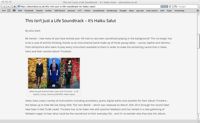 Be
honest – how many of you have wished your life had its very own
soundtrack playing in the background? This no longer has to be a case
of wishful thinking, thanks to an instrumental band made up of three
young ladies – Louise, Sophie and Gemma – from Derbyshire
who seem to play every instrument available to them in order to make
the tantalising sound that is Haiku Salut and their second album ‘Tricolore’. Be
honest – how many of you have wished your life had its very own
soundtrack playing in the background? This no longer has to be a case
of wishful thinking, thanks to an instrumental band made up of three
young ladies – Louise, Sophie and Gemma – from Derbyshire
who seem to play every instrument available to them in order to make
the tantalising sound that is Haiku Salut and their second album ‘Tricolore’.
Haiku Salut used
a variety of instruments including accordions, piano, digital works
and ukuleles for their album Tricolore – the follow up to ‘How
We Got Along After The Yarn Bomb’ – which was released on
March 25th 2013 through the record label How Does It Feel To Be Loved.
Tricolore has so far been met with positive feedback and has reined
in a new gathering of followers eager to hear what could be the soundtrack
to their everyday life – and it’s no wonder why they love
this album.
The tracks are melodic and complementary to each other; the piano is
elegant and the harmony of the different instruments gives most of the
songs a sweet edge, the exception being Leaf Stricken which sounds like
it could be played at a softies’ nightclub with a digital drum
beat and percussion.
At times the instruments sound slightly jumbled together but they are
smoothed over with a captivating background beat and a great piano accompaniment.
Despite some parts sounding a little too full of instruments, you can
hear how much effort has gone into this wonderful album and the intricacy
the three musicians have applied to make each note balance each other,
resulting in a catchy soundtrack that suits all moods.
The titles are quirky and nonsensical, beginning the cd with ‘Say
It’ and rounding off the album with a cheeky title ‘No You
Say It’; both tracks have a slightly space-y quality with digital
beats, high piano chords, and in the case of ‘No You Say It’,
a tempo change to a tune similar to work of the band Owl City.
If you’re looking for an instrumental band and album that combines
melody, quirkiness and an accordion, Haiku Salut are a band that manage
to combine instruments and tunes in a way you wouldn’t think possible,
who describe themselves as a, “Baroque-pop-folktronic-neo-classical-something-or-other”,
and will have you wishing they were following you around London belting
out their upbeat tracks as you go about your business.
Earbuddy
 Sounding
in turns like a less aggressive Patrick Wolf and a more electro Arcade
Fire, Haiku Salut’s Tricolore is charmingly warm and jubilant
without being saccharine. However, it would be unfair to compare the
album to anything else out there as it has a sound entirely its own,
having more in common with the soundtrack to a French indie film than
any of the band’s contemporaries in UK folktronica. It flits between
imaginative electronic flourishes and continental-sounding acoustic
moments, creating an engaging soundscape of what the band themselves
describe as “Baroque-Pop-Folktronic-Neo-Classical-Something-Or-Other”. Sounding
in turns like a less aggressive Patrick Wolf and a more electro Arcade
Fire, Haiku Salut’s Tricolore is charmingly warm and jubilant
without being saccharine. However, it would be unfair to compare the
album to anything else out there as it has a sound entirely its own,
having more in common with the soundtrack to a French indie film than
any of the band’s contemporaries in UK folktronica. It flits between
imaginative electronic flourishes and continental-sounding acoustic
moments, creating an engaging soundscape of what the band themselves
describe as “Baroque-Pop-Folktronic-Neo-Classical-Something-Or-Other”.
Haiku Salut have cited traditional folk as an influence along with French
film soundtracks and ’80s computer game soundtracks. These influences
couldn’t be more evident across the LP’s 12 tracks, especially
in the way that the album avoids vocals throughout. It makes do with
instruments such as “accordions, ukuleles, glockenspiels, pianos”,
according to the band’s website, as well as the “loopery
and laptopery” which results in the ‘computer game’
elements of the LP.
“Six Impossible Things” is an especially impressive piece
of folk music, as emotive and human as anything from Arcade Fire’s
famously powerful debut, Funeral. ”Glockelbar” is another
standout track, plaintive accordions contrasting the rattling electronic
elements which are presumably the track’s namesake. Penultimate
track “Train Tracks for Wheezy”, featuring a Little Orchestra,
is undoubtedly one of the most complex tracks of the LP, flaunting a
suitably majestic brass and strings finale.
Tricolore sounds like watching a rainy day from inside a log cabin or
roasting marshmallows over a campfire. Its many disparate elements come
together to form a debut LP that sounds at once childlike in its relentlessly
open and earnest tone — its thick textures woven through with
the homely echoes of the accordion – and incredibly sophisticated
in its approach to composition, an expected outcome of the collaborative
efforts of Haiku Salut’s three talented, multi-instrumentalist
members. The exciting debut is sure to catch the attention of anyone
keeping an eye on independent music in the UK.
In
Your Speakers
 Tricolore
is an interesting record. Released in late March on the How Does it
Feel to be Loved label, Tricolore is the first full length release from
the Derbyshire-based trio of Louise, Sophie and Gemma, a group of musicians
collectively known as Haiku Salut who use “accordions, ukeleles,
glockenspiels, pianos, loopery and laptopery” to produce “Baroque-pop-folktronic-neo-classical-something-or-other”
music, which is all just a fancy way of saying “a few musicians
who mash together a lot of different instruments to make subdued instrumental
music.” But all this, while informative, doesn’t say much
about what makes this album interesting. What makes Tricolore an interesting
record, in my opinion, is that depending on how you listen to it, this
can either sounds like carefully pieced together collection of songs,
each precisely made to express an individual idea or emotion, or a haphazardly
thrown together grab bag of demos made by someone having a bit too much
fun with Garageband. But both unfortunately and luckily (respectively),
the majority of Haiku Salut’s debut LP falls somewhere in between. Tricolore
is an interesting record. Released in late March on the How Does it
Feel to be Loved label, Tricolore is the first full length release from
the Derbyshire-based trio of Louise, Sophie and Gemma, a group of musicians
collectively known as Haiku Salut who use “accordions, ukeleles,
glockenspiels, pianos, loopery and laptopery” to produce “Baroque-pop-folktronic-neo-classical-something-or-other”
music, which is all just a fancy way of saying “a few musicians
who mash together a lot of different instruments to make subdued instrumental
music.” But all this, while informative, doesn’t say much
about what makes this album interesting. What makes Tricolore an interesting
record, in my opinion, is that depending on how you listen to it, this
can either sounds like carefully pieced together collection of songs,
each precisely made to express an individual idea or emotion, or a haphazardly
thrown together grab bag of demos made by someone having a bit too much
fun with Garageband. But both unfortunately and luckily (respectively),
the majority of Haiku Salut’s debut LP falls somewhere in between.
In this way, and several others, Tricolore is an album of battling opposites.
There’s the aforementioned feeling of precise thought and lawless
garbling, as well as a comparison to be made between Haiku Salut’s
use of crazy looped electronics on the one hand and simple acoustic
or woodwind instruments on the other. Though some songs, like the tremendously
beautiful “Watanabe,” stick mainly with real instrumentation,
others, like borderline personality disorder-stricken “Leaf Stricken,”
mix the two. Sometimes this works out quite well and Haiku Salut finds
themselves with a moment of music that feels very innovative and exploratory,
yet still grounded in basic notions of musical simplicity. Similarly,
the album’s real opener (if you disregard the 30 second “Say
It,” which you definitely can) “Sounds Like There's A Pacman
Crunching Away At Your Heart” goes in and out of electro-noise
rock and acoustic soft rock with intermittent moments of both success
and failure. The album’s closer “No, You Say It” is
also very electro heavy, in fact electro-heavy enough that you almost
wouldn’t be surprised to hear it at your next rave—it’s
a seriously excited song that works as a solid closer to an album with
plenty of ebb and flow.
Along with this instrumentation dichotomy, there’s also something
to be said for what feels like somewhat of a directional shift between
the A-side and B-side of the album. Separated by the somewhat helpful
delineator “Haiku Interlude #1,” Tricolore’s A-side
is much more childish, skittish, and playful than the B-side, which
generally sounds a bit more focused, formal, and grown-up—almost
as though the two halves of the album could serve as soundtracks for
two very differently themed movies. It’s not as though the album
necessarily feels disjointed of that the first few songs are childish.
Rather, there is a tempered focus found in songs like “Rustic
Sense Of Migration” and “Train Tracks For Wheezy”
that point to the development of a band that isn’t just fooling
around with a computer, but is actually thinking carefully about the
music they’re making.
These separations aren’t too surprising for a group’s first
full-length release, and it’s reasonable enough to give them time
to figure out what they want to do. Of course, a band this talented
shouldn’t limit their ideas or creative potential for fear of
making too big of a misstep, especially this early on in their career.
But if Haiku Salut were able to take all their musical energies and
focus them in one direction, rather than two or three, their ceiling
is high.
Fractured
Air
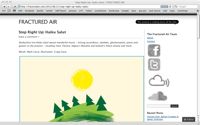 Haiku
Salut are a Derby-based trio who create gorgeous indie-pop instrumental
opuses. To categorize this highly talented set of musicians is a tall
feat. The twelve instrumental cuts on debut album, ‘Tricolore’
utilizes a plethora of instrumentation, ranging from accordions, ukeleles,
glockenspiels to piano, guitar and electronic looping. A large sonic
palette is drawn from that paints a pastoral landscape of fallen leaves,
towering trees and singing birds. ‘Tricolore’ is a joyous
and celebratory affair with each plucked guitar note, swirling piano
melody and accordion waltz. The album artwork perfectly embodies the
music of Haiku Salut, where leaves of vivid colours – orange,
blue, brown, yellow, red – adorns the white background. Similarly,
the unique blend of music contains many shades and textures that endlessly
reveal new meanings and truths. Haiku
Salut are a Derby-based trio who create gorgeous indie-pop instrumental
opuses. To categorize this highly talented set of musicians is a tall
feat. The twelve instrumental cuts on debut album, ‘Tricolore’
utilizes a plethora of instrumentation, ranging from accordions, ukeleles,
glockenspiels to piano, guitar and electronic looping. A large sonic
palette is drawn from that paints a pastoral landscape of fallen leaves,
towering trees and singing birds. ‘Tricolore’ is a joyous
and celebratory affair with each plucked guitar note, swirling piano
melody and accordion waltz. The album artwork perfectly embodies the
music of Haiku Salut, where leaves of vivid colours – orange,
blue, brown, yellow, red – adorns the white background. Similarly,
the unique blend of music contains many shades and textures that endlessly
reveal new meanings and truths.
My first introduction to Haiku Salut was their single, ‘Los Elefantes’,
released as a free download back in early Spring. The piece begins with
delicate solo piano music that conjures up timeless sounds of Erik Satie,
Gonzales and Yann Tiersen. Moments later, accordion is added that evokes
the breathtaking plains of the French countryside. Waves of electronic
pulses, percussion and double-bass forms a sumptuous groove to bring
‘Les Elefantes’ to a dramatic close. A similarly dramatic
feel is etched across the sonic canvas of ‘Lonesome George’
(Orwell, There’s No-One Like). The frantic tempos of the accordion-led
waltz is closer in feel to Eastern European, where Balkan folk music
serves the song’s blueprint.
The album’s centerpiece is undoubtedly ‘Watanabe’.
Two layers of piano melodies -played several octaves apart – wonderfully
grace the sound clouds. The intricate arrangement brings another record
to the forefront of my mind, namely Musette’s ‘Drape Me
In Velvet’, released this year on the Häpna label. This sonic
marvel – in a similar fashion to ‘Tricolore’ –
is divine instrumental music that never ceases to amaze and enlighten.
‘Rustic Sense Of Migration’ consists of piano, guitar, glockenspiel,
percussion and accordion. To witness the construction of each layer
of instrumentation is to unravel each molecule of your heart’s
pore.
‘Six Impossible Things’ is a tour de force that recalls
the modern-day luminaries of Colleen and múm. A fragile guitar-led
melody drifts like early morning mist before cascading accordion notes
rise to the foreground. ‘Leaf Stricken’ is reminiscent of
early múm records with its smooth laptop glitches, colourful
guitar tones and warm piano. ‘Tricolore’ is a rare treasure
waiting to be discovered. Seek it out on the London-based label, How
Does It Feel To Be Loved. Also available is the band’s debut EP
‘How We Got Along After The Yarn Bomb’.
When
You Motor Away
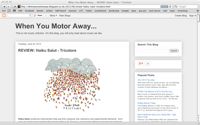 Haiku
Salut constructs instrumental indie pop from classical, folk, electronic
and experimental elements. And I urge you not to reject sampling the
charms of their LP, Tricolore, even if some of those elements are not
found among your usual musical fare. This is music played with intelligence,
passion, craft and wit. The players are capable of noodling on small
scale, and blasting with wide-screen cinematic grandeur. Without the
need for lyrics they can convey love, confusion and sadness. Well, they
do have an assist with song titles such as "Sounds Like There's
A Pacman Crunching Away At Your Heart" (ouch, I've been there).
Instrumentation includes pianos, glockenspiels, accordions, ukuleles,
and electronics. One of the revelations is how well the electronic contributions
mesh with and complement the more traditional instruments, while adding
an element of playfulness. Tricolore is a promising debut from an inventive
band, and I expect we will hear more good things from them in the future. Haiku
Salut constructs instrumental indie pop from classical, folk, electronic
and experimental elements. And I urge you not to reject sampling the
charms of their LP, Tricolore, even if some of those elements are not
found among your usual musical fare. This is music played with intelligence,
passion, craft and wit. The players are capable of noodling on small
scale, and blasting with wide-screen cinematic grandeur. Without the
need for lyrics they can convey love, confusion and sadness. Well, they
do have an assist with song titles such as "Sounds Like There's
A Pacman Crunching Away At Your Heart" (ouch, I've been there).
Instrumentation includes pianos, glockenspiels, accordions, ukuleles,
and electronics. One of the revelations is how well the electronic contributions
mesh with and complement the more traditional instruments, while adding
an element of playfulness. Tricolore is a promising debut from an inventive
band, and I expect we will hear more good things from them in the future.
Scene
Point Blank
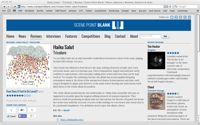 To
say Haiku Salut are an odd ensemble would fall several metres short
of the mark, judging by their 2013 release Tricolore. To
say Haiku Salut are an odd ensemble would fall several metres short
of the mark, judging by their 2013 release Tricolore.
Their music has influences from all over the map, unifying elements
of indie, post-rock, electronic music, and even baroque pop. Their compositions,
largely instrumental, rarely conform to expectations, with each piece
taking more twists and turns than can be kept track of. Yet despite
the confusing exterior, the album has an inescapably intriguing atmosphere
about it. By virtue of the unexpected choices in instruments and style,
each song is designed to pique your interest, to the point where hearing
one track means you'll likely listen to the whole album by accident.
The whole album sounds kitschy, but incidentally so--Haiku Salut sound
like they just so happened to stumble upon the magical unifying element
of musical enjoyment. They deserve credit for producing an album that
not only catches the listener off guard, but keeps her on her toes until
the very end. Tricolore is like nothing I've ever heard, and I mean
that to be a profound compliment. You definitely need to give this album
a listen.
File
Under
 Als
er ooit een huisband voor het muzikale museum Speelklok te Utrecht heeft
bestaan is het Haiku Salut wel. Ik zie een artist in residence-reeks
voor me. Band aan de slag met al die stokoude pierementen, speeldoosjes,
en zo verder. Voorlopig toert Haiku Salut nog gewoon door hun eigen
Engelse velden, waar hun tinkelende pastorale melodieën ook prima
passen, als regenbuitjes op hobbithuisjes. De groep heeft goed geluisterd
naar de god van dit soort zoete instrumentale soundtrack-schetsen: Yann
Tiersen. Gelukkig duiken er her en der ook synths en glitchende beats
op, voor een welkome IJslandse touch. "Sounds Like There's A Pacman
Crunching Away At Your Heart" kon dan weer een liedje van Tunng
zijn, en "Six Impossible Things" zal de fans van Beirut bijzonder
bekend voorkomen. Vocalen mis je ook op zulke poppy momenten volstrekt
niet. Wel ontbreekt er een gezonde dosis echte melancholie, iets waarin
de vergelijkbare Rickard Jäverling juist in excelleert. Op het
in alle opzichten alleraardigste Tricolore neigen de uiterst minutieus
in elkaar gestoken deuntjes soms naar machinaal. Een beetje ruis had
voor meer opwinding kunnen zorgen. Als
er ooit een huisband voor het muzikale museum Speelklok te Utrecht heeft
bestaan is het Haiku Salut wel. Ik zie een artist in residence-reeks
voor me. Band aan de slag met al die stokoude pierementen, speeldoosjes,
en zo verder. Voorlopig toert Haiku Salut nog gewoon door hun eigen
Engelse velden, waar hun tinkelende pastorale melodieën ook prima
passen, als regenbuitjes op hobbithuisjes. De groep heeft goed geluisterd
naar de god van dit soort zoete instrumentale soundtrack-schetsen: Yann
Tiersen. Gelukkig duiken er her en der ook synths en glitchende beats
op, voor een welkome IJslandse touch. "Sounds Like There's A Pacman
Crunching Away At Your Heart" kon dan weer een liedje van Tunng
zijn, en "Six Impossible Things" zal de fans van Beirut bijzonder
bekend voorkomen. Vocalen mis je ook op zulke poppy momenten volstrekt
niet. Wel ontbreekt er een gezonde dosis echte melancholie, iets waarin
de vergelijkbare Rickard Jäverling juist in excelleert. Op het
in alle opzichten alleraardigste Tricolore neigen de uiterst minutieus
in elkaar gestoken deuntjes soms naar machinaal. Een beetje ruis had
voor meer opwinding kunnen zorgen.
Folk
Radio
 Folktronica
– oxymoron or budding art form? Although far from new to ours
ears, the idea of electro-acoustic music is still maverick enough to
set a few Arran sweaters itching. The standard hoisted by Tunng and
others gathers more and more support, with established names such as
Lau and King Creosote developing the form. Another shining light among
these names is Haiku Salut. The Derbyshire trio are about to embark
on a tour of interesting spaces with Lau and also release their singularly
earnest and engaging debut album Tricolore on November 18th. Folktronica
– oxymoron or budding art form? Although far from new to ours
ears, the idea of electro-acoustic music is still maverick enough to
set a few Arran sweaters itching. The standard hoisted by Tunng and
others gathers more and more support, with established names such as
Lau and King Creosote developing the form. Another shining light among
these names is Haiku Salut. The Derbyshire trio are about to embark
on a tour of interesting spaces with Lau and also release their singularly
earnest and engaging debut album Tricolore on November 18th.
Haiku Salut (Gemma Barkerwood, Louise Croft and Sophie Barkerwood) draw
inspiration from many quarters; like-minded artists, film scores and
Japanese impressionistic literature all make a contribution. The sound
that these sources inspire, however, belongs emphatically to Haiku Salut.
The gently jarring repetitions of the opening electronic overture Say
It, give way to the soft acoustics of a slightly impatient guitar dancing
with piano and accordion in the beautifully entitled Sounds Like There’s
A Pacman Crunching Away At Your Heart. And it feels very much like just
that. As the electronic chords and repetitions come into play and the
wee yellow guy starts roaming around your consciousness, it feels like
Three Cane Whale discovered 8 bit gaming and they strolled off into
the woods together.
Leaf Stricken delivers an audio/visual feast of swirling autumn colours,
and in a perfect example of the contrasts that are one of the many delights
of this album, Six Impossible Things opens as a summery stroll on strings,
with detuned bass notes blundering around like a drunken bumble bee
until the stroll moves on to a bandstand in the park. The piano / accordion
mix of Los Elefants is equally evocative as it spins towards its electronic
conclusion.
Other memorable highlights include Lonesome George (Orwell, There’s
No-One Like), in which a very continental sounding George Orwell sits
somewhere along the French / Spanish border, secretly stock-piling tension
and drama. And although this album should never be regarded as a collection
of highlights (take it in as a whole – you won’t regret
it) Train Tracks For Wheezy (Featuring A Little Orchestra) stands just
that little bit more proud; a dreamy opening with a bass so laid back
it’s horizontal and Cinematic simplicity in irresistible monochrome
bursting into blazing Technicolor, for a final sixty seconds that will
fill your heart.
Not everything here is, on the surface, as complex. Glockelbar is a
gentle and hypnotic two minute glockenspiel exploration that delivers
far more in terms of texture than is immediately apparent. The closing
response to the opening track, No, You Say It, takes up the theme and
plays around some, closing the album on an emphatically electronic note.
As we mentioned last month, Haiku Salut have also contributed to the
Lau – Remixed collection, with a striking and habit-forming remix
of Race The Loser’s Torsa. In performance the band are mesmerizing;
winning their way to a place on the Green Man Rising stage at the Green
Man festival, Haiku Salut provided a spell-binding performance, and
their acclaimed Lamp Show has been delighting London audiences. Lau
fans who are lucky enough to catch them on tour over the coming month
will find Haiku Salut a perfectly chosen counterpoint, and fans of Haiku
Salut will no doubt be pleased to catch Lau live too.
Far from avoiding attaching a label to their music, Haiku Salut describe
themselves as Baroque-Pop-Folktronic-Neo-Classical-Something-Or-Other.
Well, it’s good to find your niche. On the face of it we have
an album of folktronica, but Tricolore can’t be taken at face
value. Far more than syncopated repetition of 8 bit beeps and crunches,
there are depths of colour and emotion here to set the imagination wandering
(or wondering) and the spine tingling. This is an absolute gem of an
album.
More
Than The Music
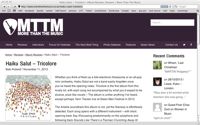 Whether
you think of them as a folk-electronic threesome or an alt-pop mini
orchestra, Haiku Salut are not a band easily forgotten once you’ve
heard the opening notes. Tricolore is the first album from this lovely
lot, with each song not accompanied by what you’d expect to be
elusive, pixie like vocals – The album is unlike anything I’ve
heard, except perhaps Yann Tiersen live at Green Man Festival in 2012. Whether
you think of them as a folk-electronic threesome or an alt-pop mini
orchestra, Haiku Salut are not a band easily forgotten once you’ve
heard the opening notes. Tricolore is the first album from this lovely
lot, with each song not accompanied by what you’d expect to be
elusive, pixie like vocals – The album is unlike anything I’ve
heard, except perhaps Yann Tiersen live at Green Man Festival in 2012.
The Amelie soundtrack this album is not, yet the likeness is effortlessly
detected. Each song opens with a different instrument – with short
opening track Say It focussing predominantly on the xylophone and following
track Sounds Like There’s a Pacman Crunching Away At Your Heart
enlisting a beautiful acoustic guitar and accordion ensemble with a
flicker of piano, just to break your heart into a few tiny pieces.
Though don’t be fooled; these girls are not to be reckoned with
in today’s modernised, EDM world full of synth-obsessed teenagers.
A minute into the second track, the ‘pacman’ melody kicks
in with a force that overrides the subtlety of earlier harmonies. The
track is one to listen to in the dying sun with a drink in hand and
good company.
Los Elefantes really strikes at their French inspirations, while diving
further into an eclectic mix of World music and synth-pop. The repetitive
beat resembles something you’d be likely to hear on one of the
BBC’s ‘what’s hot’ radio skits. It’s an
acquired taste.
Further down the list, Watanabe, Train Tracks for Wheezy and Six Impossible
Things grasp beautiful, hypnotic tunes with melodies encasing a sadness
– the first and last hints of melancholy throughout the album
– that I relate to, as any normal human would.
The album would definitely work as a soundtrack, as Tricolore appears
to emit a story that can vary for each listener. This is reinforced
through the short, sharp Haiku Interlude #1, where you’re led
to the next scene as in any perfectly timed film directed by Michel
Gondry. The album’s fusion of old and new, the mind-boggling interaction
between electronic sounds and the natural tune of a hand-held instrument
proves to take the listener on a really quite extraordinary trip.
Concluding song No, You Say It ends Tricolore with a reply to the opening
track in terms of grammar and tune. The song carries on from the first
as if it had never escaped to any other part of the album. It leaves
you questioning if you ever truly did hear anything but one, very long
and skilfully generated song.
Their music has the effect you’d expect from a yoga-induced whale
song session or a tape of heavy, falling rain – your imagination
goes wild, while your body relaxes into nothingness. And in the final
moments of Tricolore, one is left excited and awestruck by the prospect
of what Haiku Salut will deliver next.
The
Arts Desk
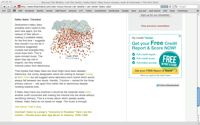 Derbyshire’s
Haiku Salut probably aren’t dyed-in-the-wool new agers, but the
reissue of their album – making it available widely for the first
time – suggests they wouldn’t run too far if someone suggested
crystals had energies they could draw from. This is open-minded music.
The seam they tap into is organic, yet they employ minimal colour from
electronica. Derbyshire’s
Haiku Salut probably aren’t dyed-in-the-wool new agers, but the
reissue of their album – making it available widely for the first
time – suggests they wouldn’t run too far if someone suggested
crystals had energies they could draw from. This is open-minded music.
The seam they tap into is organic, yet they employ minimal colour from
electronica.
That implies that Haiku Salut are what might have been labelled folktronica,
the clunky designation which did nothing to hamper Tunng or Beth Orton
but did suggest some laboratory-born hybrid which would always fall
between two stools. Handily, Tricolore – named for the three primary
colours – sits apart from either folk or electronica despite nodding
towards both.
If Haiku Salut have any brethren it would be the Icelandic band mu˜m,
another outfit concerned with making the minimal into the whole without
sacrificing intimacy. This is a lovely album which speaks quietly. Indeed,
Haiku Salut do not speak on stage. The music is enough.
Bearded
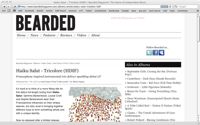 It’s
hard to to think of a more fitting title for this debut full-length
outing from Haiku Salut. Gemma Barkerwood, Louise Croft and Sophie Barkerwood
wear their Francophone influences on their stripey sleeves, but also
revel in bringing together different hues to form something whole and
with a unique identity. It’s
hard to to think of a more fitting title for this debut full-length
outing from Haiku Salut. Gemma Barkerwood, Louise Croft and Sophie Barkerwood
wear their Francophone influences on their stripey sleeves, but also
revel in bringing together different hues to form something whole and
with a unique identity.
Now re-released after a limited release earlier this year, this album
marks something of a departure from the crystalline indie-pop usually
associated with the excellent HDIF label (which, in the past, has brought
us the likes of Butcher Boy, Pocketbooks and Antarctica Takes It!) -
weaving together piano, glockenspiel, wheezing accordion, coquettish
rhythms and analogue synth sounds to create a giddy, ambitious and accomplished
record. ‘Sounds Like There’s a Pacman Crunching Away At
Your Heart’ in particular combines these elements to great and
bizarrely poignant effect, flitting from bruised, pastoral folk to 8-bit
torch song to the dance floor, before a mournful, piano-led denouement.
Elsewhere, each of these elements takes its turn, with the magpie-like
three-piece dabbling in near-baroque piano (‘Watanabe’),
lilting Britfolk (‘Rustic Sense of Migration’) and the sound
of an autumnal day in the Derbyshire countryside (‘Train Tracks
For Wheezy’). Tricolore sounds at its best when they’re
using very different textures as part of one broad palette - ‘Glockelbar’
melds music box melody and pulsing beats with simmering electronics,
like Dosh going hill-walking in rural England, and single ‘Los
Elefantes’, with its melancholy piano and accordion, channels
Yann Tiersen before going off in another direction entirely.
The record is book-ended by ‘Say It’ and ‘No, You
Say It’ - the former’s half-minute sets the tone for a gentle,
off-kilter suite of songs, while the latter reprises that opening melody
and pushes it as far as it can go. It’s a beatific concoction
of picked melody, twinkling music box sounds and quietly skittering
rhythms, which slowly build until the half-way point, where the song
evolves into thumping folk-trance. A delightfully unexpected coda, it
underlines the imagination and scope here - that the trio shift gear
so readily without it sounding jarring is a rare achievement indeed.
There’s a freewheeling eclecticism and playfulness at the heart
of Tricolore, resulting in a joyous amalgam of sounds and contrasts.
With their duality of organic and often rustic instrumentation, combined
with carefully layered electronic textures, Haiku Salut often recall
the digital folk of Tunng’s earliest output, as well as Tiersen’s
soundtrack compositions, but have forged their own wonderful debut brimming
with ideas and great musicianship. It’s a magical collection of
songs, and one you should seek out immediately.
Inner
Monologue
 Totally
original, Brilliantly esoteric and deliciously Francophilic throughout
(as the title suggests) Tricolore occasionally feels like it might have
been at home on the soundtrack to Amelie with twee accordion and delicate
piano refrains, but these deceptively acoustic threads don’t tell
the full story. Washed through with glitched beats and loops, the trio’s
electronic side is just as adept. Totally
original, Brilliantly esoteric and deliciously Francophilic throughout
(as the title suggests) Tricolore occasionally feels like it might have
been at home on the soundtrack to Amelie with twee accordion and delicate
piano refrains, but these deceptively acoustic threads don’t tell
the full story. Washed through with glitched beats and loops, the trio’s
electronic side is just as adept.
Nothing remains serious for long within the world of Haiku Salut and
consequently every last track on Tricolore is full of childlike glee
and imbued with an irrepressible playfulness that makes it an absolute
joy to listen to. What’s important is that this record sounds
like it was fun to make – and that’s a totally infectious
quality to have captured on tape. Effortlessly charming and endearingly
imperfect this first effort from the threesome is easily one of the
most instantly loveable albums of recent years.
Lira
 Ibland
målar musiken upp en skir, pastoral idyll. Ibland låter
det som isländska gruppen Amiina. Eller som musiken på ett
parisiskt kafé – Yann Tiersen, som gjorde musiken till
filmen Amelie från Montmartre, är en av gruppens influenser.
Dragspelet är en tydlig ledtråd, och har delvis varit orsak
till att de har jämförts med svenska Detektivbyrån. Ibland
målar musiken upp en skir, pastoral idyll. Ibland låter
det som isländska gruppen Amiina. Eller som musiken på ett
parisiskt kafé – Yann Tiersen, som gjorde musiken till
filmen Amelie från Montmartre, är en av gruppens influenser.
Dragspelet är en tydlig ledtråd, och har delvis varit orsak
till att de har jämförts med svenska Detektivbyrån.
Det handlar om instrumentalgruppen Haiku Salut, som varken är från
Japan eller från Frankrike, som namnet kan antyda, utan är
en ovanlig och charmerande, ung, kvinnlig trio från grevskapet
Derbyshire i England.
Gruppen består av multiinstrumentalisterna Gemma och Sophie Barkerwood
och Louise Croft. De beskriver själva sin musik som “baroque-pop-folktronic-neo-classical-something-or-other”,
vilket de framför på bland annat dragspel, gitarr, ukulele,
piano, klockspel och slagverk, med hjälp av den del loopande och
laptopande!
Musiken har ett inneboende, lekfullt vemod och en självklar käckhet,
ofta manifesterat i repetitiva fraser och ett efterhängset techno-rytmiserande.
Det är en sorts musikalisk naivism, som både bedårar
och avväpnar; en låt “behövde en trumpet”,
så Gemma lärde sig att spela, för den enda låtens
skull. Varje låt har sin lilla egenhet – och priset går
till Watanabe, där de tre unga damerna spelar sexhändigt på
ett piano.
Prog
 Angst
remains an ever valuable commodity in the rock world, so welcome Derbyshire’s
Haiku Salut whose debut album shines a rainbow-coloured beam of unadulterated
happiness across the sky without once having to resort to words. If
this is setting off your twee detector already, don’t panic. Tricolore
has charm to spare, but it never becomes sickly. Electronic loops and
samples sound atypically bucolic, opener Say It twinkles away like a
galaxy. Acoustic guitars, accordions, trumpets, pianos and glockenspiels
in hand, the band waltz, they swoon, they skip and (hell, why not) they
even polka. Angst
remains an ever valuable commodity in the rock world, so welcome Derbyshire’s
Haiku Salut whose debut album shines a rainbow-coloured beam of unadulterated
happiness across the sky without once having to resort to words. If
this is setting off your twee detector already, don’t panic. Tricolore
has charm to spare, but it never becomes sickly. Electronic loops and
samples sound atypically bucolic, opener Say It twinkles away like a
galaxy. Acoustic guitars, accordions, trumpets, pianos and glockenspiels
in hand, the band waltz, they swoon, they skip and (hell, why not) they
even polka.
It’s the kind of music made for exploring the woods, making dens
and reliving childhood summers, warm and beautiful and searching for
joy in every corner. But best of all, there’s no one really like
them out there at the moment. Sure, they share extra-terrestrial bleeps
and electro-dreams with The Postal Service, alongside the glitchy warmth
of Iceland’s mum, the marching, Mediterranean, brassy antiquity
of Beirut and even flashes of Ravel. But this is classically influenced
dreampop that’s as English as Victorian pictures of fairies at
the bottom of the garden, and just as magical.
Mojo
 The
annual Green Man Rising festival battle of the bands has developed a
reputation for producing musical surprises. This year, Haiku Salut proved
to be the revelation, dismissing any scepticism this correspondent felt
for their name with a set of whirling, neo-classical, folk-tronic skronk.
Challenging yet comforting, Tricolore, their self-produced debut album,
reconfirms the fact that multi-instrumentalists Sophie Barker, Louise
Croft and Gemma Wood are a singular musical force. Despite their indie
rock past in The Deirdres, they cite Yann Tiersen as a prime influence,
and it shows. Melodicas, accordions, glockenspiels, ukuleles, ill-sounding
horns, nimbly picked guitars, laptops and electronic loops animate the
likes of Sounds Like There’s A Pacman Crunching Away At Your Heart
and the beauteous Six Impossible Things. In fact, Tricolore feels like
an imaginary soundtrack. Quite what the film itself is all about is
entirely down to you. The
annual Green Man Rising festival battle of the bands has developed a
reputation for producing musical surprises. This year, Haiku Salut proved
to be the revelation, dismissing any scepticism this correspondent felt
for their name with a set of whirling, neo-classical, folk-tronic skronk.
Challenging yet comforting, Tricolore, their self-produced debut album,
reconfirms the fact that multi-instrumentalists Sophie Barker, Louise
Croft and Gemma Wood are a singular musical force. Despite their indie
rock past in The Deirdres, they cite Yann Tiersen as a prime influence,
and it shows. Melodicas, accordions, glockenspiels, ukuleles, ill-sounding
horns, nimbly picked guitars, laptops and electronic loops animate the
likes of Sounds Like There’s A Pacman Crunching Away At Your Heart
and the beauteous Six Impossible Things. In fact, Tricolore feels like
an imaginary soundtrack. Quite what the film itself is all about is
entirely down to you.
End
Of The Year poll mentions
A
Closer Listen
Accordion,
glockenspiel, trumpet, drumsticks and more add up to an ebullient tone
on this fully-fledged debut album, recorded in the middle of two EPs.
This is the sound of confidence and fun, with a wink, a smile and a
dob of sass.
For
The Rabbits
What
can you expect from a debut album? Well based on this, an awful lot!
Perhaps one of the less well known albums on the list, but one that’s
received almost unanimously stunning reviews, and you know what it couldn’t
be any more deserved. The all female, instrumental 3-piece from Derby
have made one of the most unique and intriguing album of the year. Part
Amelie era Yann Tiersen, part traditional English folk band. Blasts
of accordion, tinkles of glockenspiel and a whole lot of what sounds
like pretty much every other instrument they could find. I’ve
never heard anything quite like it, and in doing that they’ve
made one of the most magical album of the year! Buy it! Buy it now!
The
Null Device
The début full-length album from the band that formed from one
half of The Deirdres treads a far less rambunctious, and slightly less
twee, path. Eschewing the handclaps-and-glockenspiel mayhem of indiepop,
Haiku Salut venture at times into cinematic chamber-pop reminiscent
of Yann Tiersen (Los Elefantes, Lonesome George), Múm-style glitchy
dreampop (Leaf Stricken) and the more pastoral ends of the post-rock
spectrum (Rustic Sense of Migration), alternating between piano, classical
guitar, various percussion, accordion and electronic beats.
Muzik
Discovery
Instrumental trio Haiku Salut's debut isn't wanting for personality:
the group packs in a street orchestra's worth of instruments and genres
over twelve tracks. What I appreciate most about Tricolore, though,
and what makes it more than the sum of its parts, is a small bookend:
the album opens with "Say It," a haunting melody played on
a warbly synth keyboard, and closes with a response--"No, You Say
It"--where the melody recurs before spinning out of control into
a euphoric four-on-the-floor dance ditty. In its wild ambition, Tricolore
isn't just trying to be unique; it's razing old conventions to the ground
and making way for new ones.
I
Prefer Their Older Stuff
Describing themselves, with tongue firmly in cheek, as Baroque-Pop-Folktronic-Neo-Classical,
this debut from the Derbyshire trio is a delicate, instrumental, glitchy
little beauty! Could fit beautifully soundtracking the next Jean Pierre
Jeunet movie!
Sweeping
The Nation
"Baroque-Pop-Folktronic-Neo-Classical-Something-Or-Other",
the Derbyshire multi-instrumentalist trio call this sound, which does
this bit out of a job. You might also add a twisted about version of
post-rock's use of slow build, repetition and instrumental flourishes,
deployed here so seemingly clashing parts - a fingerpicked acoustic,
an accordion, an 8-bit electronic sample - gradually coalesce into form
fitted shape, complex layers developing layers ande depth that can be
as much floating and euphoric as pinpricks in existing melodic structure.
Often incapable of sitting still, the loops and flourishes serve to
both develop its baroque nature and then pull it apart. It's an album
that knows its touchstones, whether Yann Tiersen, Haruki Murakami or
Wes Anderson, but really sounds like nobody else.
Ears
For Eyes
I
bought this one after reading the unanimous praise it was getting in
the press, it cheers me up no end.
Happy
Fingers Productions
The members of Haiku Salut clearly have a large record collection. ‘Tricolore’
is a work that can’t be pigeonholed into a single genre. It’s
not that the songs are detached from each other, much the opposite,
it’s that every song shoehorns in a whole host of disassociated
influences to create one beautiful whole. On the one hand the music
recalls the playful organic sound of Penguin Cafe Orchestra. On the
other it lends ideas from experimental ambient electronic artists such
as Helios and Mum. There’s also an undoubted nod towards traditional
folk music and twee pop. Despite the multiple styles ‘Tricolore’
sounds remarkably uncluttered. It’s a homely, dainty album, as
fragile as a snowflake falling from a tree on a winters day. That it’s
the debut from the all female three-piece is really quite staggering.
Haiku Salut have arrived fully formed.
In
Forty
A truly unique record, brimming with atmosphere and untold stories.
See
Inlay For Details
Haiku Salut’s debut appeared as if from nowhere. An all-but-dormant
but much beloved label announced at the start of the year that they’d
signed the band and that the album was immediately available. Knowing
nothing of them in the slightest but having total faith in the label,
an order was duly placed with little expectation.
If the band had been hyped for months, my expectations would have been
more than surpassed.
Tricolore is an extraordinary piece of work. Part Yann Tiersen (hence,
one assumes, the Gallic title), part eclectic Japanese videogame soundtrack,
part classically trained string trio, it’s an album that shouldn’t
exist, let alone written by three girls from Derby.
It’s a truly beautiful listen. More so than any other record on
this list, it’s an album that absolutely bowls this listener away
with its intimacy, beauty, intricacy, and sheer talent. You don’t
expect such a classic orchestration to be occasionally accompanied by
little electronic glitchy melodies, and you sure don’t expect
an instrumental album to paint as vivid pictures as Tricolore does.
'Watanabe', listened to in the snowfall of January, moved me more than
anything else this year. That the final track loops back perfectly with
the first has meant that, more often than not, a single listen has been
impossible. It is something which begs to be listened to over and over
again and doesn't ever fatigue or bore.
It’s such a great album. Albert Camus (famously quoted on Scott
4) said that “a man’s work is nothing but this slow trek
to rediscover, through the detours of art, those two or three great
and simple images in whose presence his heart first opened.” I
grew up with Yann Tiersen, Neil Hannon, similar orchestral pop, and
the Nintendo Game Boy. Haiku Salut feel like the modern amalgam of all
those loves from times past and I truly love them for it.
Urban
75
They
sound like they should be French or Spanish, but are actually from the
East Midlands. It’s a smorgasbord of delights, folky, ambient,
and just darn funky. Hints of AotY favourites Beirut come through, making
Haiku Salut easily the most popular new band on this years list.
To buy "Tricolore" by Haiku Salut go here
|
















 Angst
remains an ever valuable commodity in the rock world, so welcome Derbyshire’s
Haiku Salut whose debut album shines a rainbow-coloured beam of unadulterated
happiness across the sky without once having to resort to words. If
this is setting off your twee detector already, don’t panic. Tricolore
has charm to spare, but it never becomes sickly. Electronic loops and
samples sound atypically bucolic, opener Say It twinkles away like a
galaxy. Acoustic guitars, accordions, trumpets, pianos and glockenspiels
in hand, the band waltz, they swoon, they skip and (hell, why not) they
even polka.
Angst
remains an ever valuable commodity in the rock world, so welcome Derbyshire’s
Haiku Salut whose debut album shines a rainbow-coloured beam of unadulterated
happiness across the sky without once having to resort to words. If
this is setting off your twee detector already, don’t panic. Tricolore
has charm to spare, but it never becomes sickly. Electronic loops and
samples sound atypically bucolic, opener Say It twinkles away like a
galaxy. Acoustic guitars, accordions, trumpets, pianos and glockenspiels
in hand, the band waltz, they swoon, they skip and (hell, why not) they
even polka.  The
annual Green Man Rising festival battle of the bands has developed a
reputation for producing musical surprises. This year, Haiku Salut proved
to be the revelation, dismissing any scepticism this correspondent felt
for their name with a set of whirling, neo-classical, folk-tronic skronk.
Challenging yet comforting, Tricolore, their self-produced debut album,
reconfirms the fact that multi-instrumentalists Sophie Barker, Louise
Croft and Gemma Wood are a singular musical force. Despite their indie
rock past in The Deirdres, they cite Yann Tiersen as a prime influence,
and it shows. Melodicas, accordions, glockenspiels, ukuleles, ill-sounding
horns, nimbly picked guitars, laptops and electronic loops animate the
likes of Sounds Like There’s A Pacman Crunching Away At Your Heart
and the beauteous Six Impossible Things. In fact, Tricolore feels like
an imaginary soundtrack. Quite what the film itself is all about is
entirely down to you.
The
annual Green Man Rising festival battle of the bands has developed a
reputation for producing musical surprises. This year, Haiku Salut proved
to be the revelation, dismissing any scepticism this correspondent felt
for their name with a set of whirling, neo-classical, folk-tronic skronk.
Challenging yet comforting, Tricolore, their self-produced debut album,
reconfirms the fact that multi-instrumentalists Sophie Barker, Louise
Croft and Gemma Wood are a singular musical force. Despite their indie
rock past in The Deirdres, they cite Yann Tiersen as a prime influence,
and it shows. Melodicas, accordions, glockenspiels, ukuleles, ill-sounding
horns, nimbly picked guitars, laptops and electronic loops animate the
likes of Sounds Like There’s A Pacman Crunching Away At Your Heart
and the beauteous Six Impossible Things. In fact, Tricolore feels like
an imaginary soundtrack. Quite what the film itself is all about is
entirely down to you.